- Home
- Mary Wesley
Dubious Legacy Page 10
Dubious Legacy Read online
Page 10
His father would have accepted some suggested alternative which would equally serve his purpose. Henry sighed, remembering his mother. Dying, she had told him, ‘Take care of your father, darling. Without me he will be a brakeless toboggan.’ Furious with her for dying, he had shouted, ‘Of course I shall,’ and it was years later, when he had come to terms with her loss, that he remembered her adding in a whisper, ‘And your emotional brakes leave much to be desired. A bit on the wonky side—’
He had not, in adolescence, cared for this criticism, pushing it aside in a fury of grief. What would she advocate now? Would she suggest a divorce, or would she recognize its impossibility?
Margaret did not commit adultery, nor would she desert him. Counsel, when consulted, had suggested that since adultery and desertion were in the eyes of the law the only cause for divorce, he should sue his wife for the restitution of conjugal rights. ‘That might get things moving,’
Appalled by this suggestion, he had exclaimed, ‘That’s the last thing I want!’
Losing interest, Counsel had said, ‘Then I can’t help you. If she won’t take a lover or desert you, you are stuck waiting for the Grim Reaper.’ Then, reviving slightly, ‘One hears she’s a good looker; surely, if you kept your eyes open, there might be some sexual slip? Bit of hope along those lines? It would be natural, would it not?’
Disgusted, Henry had flared up. ‘If anyone commits adultery, as you insist on calling it, it is I who do.’
‘Well, well,’ said Counsel, positively genial, ‘and isn’t she interested?’ And when Henry answered, ‘No,’ Counsel said, ‘Sad.’ And that, apart from his plump fee, had been the end of it and his marriage, such as it was, continued as before.
‘What are you thinking, Henry? A penny for your thoughts.’ Calypso, coming out through the house, slid her hand through his arm. ‘My,’ she said, ‘you look elegant. That’s your dear old pa’s get-up, isn’t it?’
‘His pa’s, actually. Father belonged to the Oxford bags era; grandfather’s was the pipe-stem. I didn’t hear you arrive. Where’s Hector?’ Henry bent to kiss Calypso’s cheek.
‘He’s parking the car. What were you thinking? You looked rather grim.’
‘I was contemplating murdering Margaret,’ said Henry, who had reached in his thoughts his usual conclusion. If he had not been in love with Calypso, if he had not heard that she had married Hector, he would not have got so drunk that on receiving his father’s letter while still in an alcoholic stupor he had acted instantly, quixotically and fatally. ‘I was wondering how to set about it,’ he said lightly, glad that Calypso had never known of his passion, a passion long since distilled into friendship. ‘But I shan’t bother,’ he said.
‘If you change your mind, let me know how we can help,’ said Calypso. ‘There would be no shortage of volunteers among your friends.’ Then she said, ‘Goodness, Henry, this is like old times. I remember your mother at the last party I came to. She wore a stunning dress. She was a lovely person, and so was your father. Look,’ she said to Hector, who joined them at this moment, ‘look at Henry, he’s wearing his grandfather’s clothes. Puts you in the shade, doesn’t he? Were all Tillotsons your shape, Henry?’
Hector took Henry’s hand. ‘Tailors were tailors in those days,’ he said, smiling. ‘Nothing they enjoyed better than dressing a beanpole. Good to see you. I say, look at that.’ He stared appreciatively at the dinner table. ‘How splendid that all looks! Is Margaret putting in an appearance?’ he asked easily. ‘Any pretty girls to put Calypso on her mettle?’
‘Matthew Stephenson brought Antonia Lowther and Barbara O’Malley came with James Martineau. Both lots, by the way, got themselves engaged last night.’
Calypso said, ‘June moon and hot weather, predictable.’
‘And as to Margaret,’ said Henry, ‘her place is laid and she has a dress; the rest is up to her.’
The three friends stood contemplating Margaret. Then Hector asked, ‘Who else is coming?’
‘The Bullivants.’
‘Big feet,’ murmured Calypso, ‘metaphorically.’
‘And the Jonathans,’ said Henry.
‘The dears,’ said Calypso.
‘Come along, let me get you a drink,’ said Henry.
‘I shall flirt with Pilar,’ said Hector, as they strolled towards the bar. ‘She likes it, I like it and Calypso does not object.’
‘You should do your duty and make verbal passes at Margaret,’ said Calypso, grinning.
‘Too risky,’ said Hector, and burst out laughing so hard that his face, tanned by recent Italian sun, went brick red.
Still thinking of his wife as he uncorked champagne, Henry remembered the occasion when he had asked her to divorce him and the malevolence of her refusal. ‘And how was Italy?’ he asked, pouring the wine.
‘Exquisite as ever, but you know Hector; he needs to get back to his trees.’ Calypso sipped her wine. ‘He thinks they miss him.’
‘I am hoping to import some sweet chestnuts from the woods above Carrara,’ said Hector. ‘I shall get myself snarled up with Customs and Min. of Ag. again.’
‘I always supposed you enjoyed such tussles,’ said Henry.
‘Age blunts my zest, it all takes so long,’ said Hector, ‘but you must come over soon and see the wood.’
Calypso said, ‘Yes, Henry, do; the wood is beginning to look like a wood. You have not been for ages.’
‘Not since I brought Margaret,’ said Henry.
Hector said, ‘Ah. Exactly.’
Calypso suppressed a smile. Hector had been furious out of all proportion when Margaret snapped that beech sapling and uprooted a small yew. (Oh dear! I thought it was a weed!) It would be better, here she agreed with many of Henry’s friends, if Henry ceased his efforts to get his wife out of bed. But I must remember my principles and not interfere, she thought. So she smiled at her husband and Henry and sipped her drink.
Watching Calypso, Henry thought, Oh, bugger it, I am taking an awful risk with this party.
Hector, also watching his wife, asked, ‘Are all those young people besotted with love?’
‘Not so that you’d notice,’ said Henry. ‘I hadn’t really thought, but with the girls it seems more of an—’
‘An arrangement?’ suggested Calypso. ‘I’ve met their families, pretty drear. Extremely worthy, of course.’
Hector said, ‘Now, darling.’
Calypso said, ‘But it’s true, you must agree.’
Henry said, ‘Both girls have been to see Margaret.’
‘Did they emerge intact?’ asked Calypso.
‘Since you saw her last,’ said Henry, ignoring Calypso’s query, ‘she’s had her room redecorated.’
‘So she tired of the black and white,’ said Hector. ‘Switched off Cecil Beaton?’
‘It is all gold and mirrors now.’
‘Must cost you a bomb,’ said Hector.
‘It’s good practice for Ebro, he is taking it up professionally,’ said Henry.
‘It can’t cost as much as taking her to stay at Claridges,’ said Calypso, forgetting her earlier resolution.
The friends were silent as they remembered how, a year or two after the war, in an effort to surprise his wife from her habit of bed, Henry had contrived to get her up to London in the hope of distracting her with plays, concerts and exhibitions. Arriving in London, Margaret had holed up in Claridges. It had taken six weeks to extract her, and the promise of a new bed.
Henry said, ‘Well,’ feeling sheepish.
Calypso said, ‘I am not mocking,’ and thought, He is afraid of scenes.
Henry said, ‘Of course you’re not,’ rather stiffly.
‘I suppose,’ said Hector, ‘she still plays gin rummy with Trask? And has a masseuse and the lady to do her face and has all her meals brought up on trays and buys clothes she never wears—’
Calypso said, ‘Hector, stop it!’
Hector said, ‘Lancing a boil.’
Henry said, ‘Not the
sort of boil that goes away, but thanks for trying.’
‘And she isn’t mad,’ said Calypso. ‘I blame your father.’
‘My father had nothing to do with it,’ said Henry defensively.
Calypso said, ‘Yes, he did. He pickled you in his principles when you were little. You grew up defenceless. You were much too nice! I can’t believe he had nothing to do with it.’ Then, seeing Henry’s expression, she said, ‘Sorry, Henry. Hector is about to yell at me to shut up and mind my own business, so I shall, before he does.’
‘I was wondering,’ said Henry, as he refilled their glasses, ‘whether you would like a few young hollies for your wood, Hector?’
‘Yes, please,’ said Hector. ‘Thank you.’
Hector and Calypso thought of the defensive prickles of holly vis-a-vis Margaret and felt a little better about her.
Henry said, ‘Good, I’ll bring them over in the autumn and help you plant them.’
‘Henry,’ Pilar called from the house, ‘can we bring the food out now?’
Henry excused himself and went indoors. Hector took his wife’s arm and they strolled down the garden. He said, ‘D’you suppose Margaret is mad?’
Calypso said, ‘Sane as they come. Bad. It’s not as though she can’t get out of bed; she can and does. She simply prefers the horizontal, and solo at that.’
Hector said, ‘Henry’s father was a crony of my parents before he married—’
‘What was he like in those days? I never knew him well.’
‘By my father’s account he was a sort of Tropic of Cancer character, who souped up Paris in the twenties, but when he met Henry’s mother he converted to high principles and changed completely, and with his dying breath wrecked Henry’s life.’
‘How?’
‘He imposed his ideals on his son,’ said Hector, not answering his wife’s query.
‘How d’you know?’ Calypso repeated.
Hector, not prepared to admit that he listened to gossip, still did not answer.
‘The old man was pretty marvellous when he rescued Pilar,’ said Calypso. ‘She and Ebro would have died if it had not been for him.’
Hector said, ‘True.’
‘And Henry goes on being good to her and she repays him. I wish,’ said Calypso, ‘that I had a Pilar to run our house. What a help she would be with Hamish.’ (Hamish being Hector and Calypso’s schoolboy son.)
Hector said, ‘Darling, I love you,’ laughing.
His wife, who never admitted to personal experience of this emotion, said, ‘So you do,’ and squeezed his arm.
Hector, speaking half to himself, remarked, ‘Henry is flawed, which may be his salvation.’
‘In what way?’
‘He won’t necessarily hold back,’ said Hector.
‘D’you mean he will murder Margaret?’
‘Don’t be silly. I mean he won’t be over-scrupulous; he will take risks. He will get fun out of life, in spite of Margaret.’
Calypso said, ‘I hope you are right. Clever of you to spot it. Should we not go back and meet our fellow guests and brace ourselves against the possibility of Margaret?’
As they sauntered back towards the house she thought that if Henry had been as he was now in her wild and frisky days, she would have nipped him into bed in a trice, and chuckled. And Hector, cognizant of his wife, smiled too.
The long table was now crowded. Three stately salmon lay on grand platters. In death they nestled on beds of glistening watercress. In each fish’s mouth Pilar had placed a red rose, but above the roses the great creatures’ eyes were blank.
There were sauce boats of mayonnaise, butter-pats sweating in silver dishes, French bread, mountains of asparagus, finger-bowls afloat with flower petals, damask napkins intricately folded, and soup plates expectant of gazpacho.
On the side table, under Antonia’s lily arrangements, stood bowls of strawberries and raspberries, jugs of cream and bowls of sugar.
Hector said, ‘Yum, yum.’
Antonia and Barbara came out of the house in a rush, Antonia in palest pink, Barbara in enigmatic, smoky blue. Their hair was freshly washed, their faces unblemished by time. Behind them came Matthew and James, looking pleased with their girls and relatively content with their dinner jackets.
As Henry began introductions, Peter and Maisie Bullivant and the Jonathans arrived in a chattering group. Jonathan called out, ‘Here we come mopping and mowing. Are we on time, Henry, or smartly late? Quite a shock to be greeted at the front door by Trask in disguise; for a moment we thought your party was fancy dress, but he reassured us. Mind you, we would have rushed home and dressed in our Pierrot costumes had it been necessary. Dear me, Calypso, how d’you do it? Beautiful as ever. Seeing you one is a teeny bit tempted to do what my old Nanny always said the Good Lord made me for. May I kiss you?’
‘Old nannies’ hopes are not always fulfilled.’ Calypso extended her cheek as Jonathan, brushing back a lock of prematurely white hair, bent to kiss it.
Antonia, who had heard that he was homosexual, was surprised to see that he wore a wedding-ring.
‘Darlings, look at that,’ he exclaimed, gazing at the dinner table. ‘What a feast!’
‘All Pilar’s work, I bet,’ said John. ‘Oh, my dears, don’t those poor fish look dissipated. It will be a shame to eat them, they are so pretty. Is Margaret to play skeleton at the feast, or shall I stand in for her? We are dying to know,’ he said, taking Henry’s hand between both of his and squeezing it.
‘I shall show no pity to the fish,’ exclaimed Jonathan, thinking that his lover’s mention of Henry’s wife was ill-timed if not precisely tactless. ‘I am Jonathan the strong,’ he said, introducing himself to Barbara. ‘He is John the weak. Oh, thank you,’ he said, accepting a glass of champagne from Henry. ‘Delicious.’
John the weak said, ‘What joy, what pleasure,’ as he, too, was given a drink. Barbara watched, surprised, as he strained the wine through his luxuriant moustache and thought how disapproving her parents would be to see her in such company. They will shortly have to lump it, she told herself, smiling past them at James. I shall be married and beyond their jurisdiction. ‘James and I have just got engaged,’ she said, drawing James close by his sleeve. ‘He proposed in a hayfield.’
‘Romantic if you are not allergic,’ said John and souped another gulp of champagne, adding, ‘as I am.’
‘The poor love is a martyr,’ said Jonathan. ‘One puff of pollen and it’s sneeze all night. Did I hear right, you are engaged?’
Barbara said, ‘Yes, and so is Antonia.’
‘Your great friend?’
‘Yes, greatest.’
‘And you do everything together?’
‘Well—’
‘So nice. You must let us advise you all on beds,’ exclaimed Jonathan. ‘Many a marriage has foundered on springs. We happen to have done a lot of research and at last we found the most—gorgeous—bed! You see, if you are of different weights well, look at your fiancé, a great burly fellow, and you, you can’t weigh more than eight stone—with the normally springy mattress the smallest and lightest keeps rolling downhill as poor darling here used to do and it wasn’t always, though sometimes it was, delightful. To cut a long story, we rootled round the shops and found this marvel, no, not Heal’s, I’ll write the address for you. It’s two friends of ours who have started the business and funny thing, our hostess, I suppose she is our hostess, has one of the early models. Henry of all people discovered them. She is crazy about it, perhaps that’s why she—’
‘Never gets out of it.’ James, not pleased at having such intimate advice thrust on his fiancée, supplied the end of the sentence.
Jonathan said, ‘You guessed,’ and pushed back his forelock.
Barbara thought, Perhaps James was on inferior springs when he bounced with Valerie, and let off a high-pitched giggle, while Antonia, who was listening, pigeon-holed the snip of information. She had recently been told by her elder brother that Peter Pears and
Benjamin Britten shared a bed and refused to believe him.
‘What is Maisie doing?’ said John. ‘Do look.’
Maisie Bullivant, clasping her hands together in self-esteem, stood back as they viewed her work. On each fishy eye she had put a nasturtium leaf and tiny blades of grass, making the effect of an eye-patch. ‘Maisie, that is altogether too louche,’ said Jonathan. ‘You will hurt Pilar’s feelings. Take it off,’ he hissed to John, ‘before she sees it.’
While John complied, Peter reproached his wife. ‘You always go too far.’ But his wife was giving the impression that she never went anywhere.
Calypso murmured to Hector, ‘That woman never thinks before she acts,’ then more generously, ‘but I like that dress she’s wearing.’ Perceiving Maisie’s rueful expression as she realized her faux pas, she said, ‘That’s a super dress, Maisie, where did you get it?’
‘So we are on our best behaviour,’ said Jonathan to John.
Henry, refilling their glasses, murmured, ‘Keep it up, boys, keep it up.’
Trask signalled from the house and Henry, going up to him, asked, ‘Is Margaret coming down?’
‘Doesn’t say yes nor no,’ said Trask, respectable in a black coat and striped trousers. ‘Pilar says give a shout when you’re ready for the soup. Her’s got her tray,’ he gestured upwards, ‘in case.’
Henry said, ‘You look ridiculous in those clothes.’
Trask replied, ‘Look who’s talking. What about the soup?’
Henry, glancing at his guests, said, ‘They seem fairly happy.’
‘At the rate you’re pouring the drink they’ll be sozzled before they eat,’ said Trask.
Henry said, ‘Rubbish. All right, tell Pilar we are ready.’ Turning back to his guests, he called out, ‘Who is for Pilar’s gazpacho? Will you arrange yourselves?’ He went to help Pilar and Ebro.
Ebro was wearing black trousers and a white shirt. He had slicked back his hair and bound his waist with a red scarf; he appeared on the steps balancing a soup tureen on the upward-turned palm of each hand and stood so poised for the guests’ admiration.

 Jumping the Queue
Jumping the Queue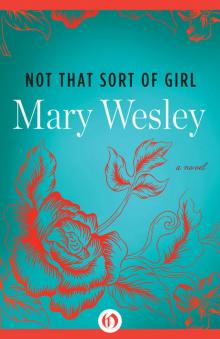 Not That Sort of Girl
Not That Sort of Girl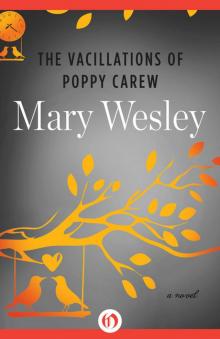 Vacillations of Poppy Carew
Vacillations of Poppy Carew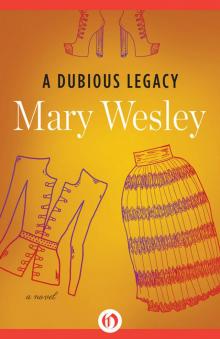 Dubious Legacy
Dubious Legacy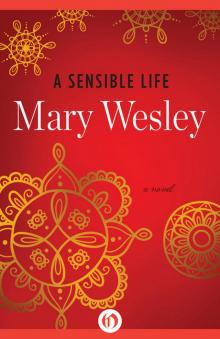 Sensible Life
Sensible Life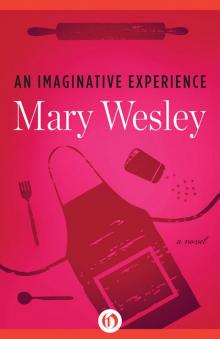 Imaginative Experience
Imaginative Experience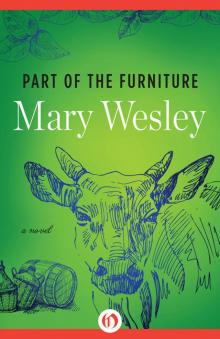 Part of the Furniture
Part of the Furniture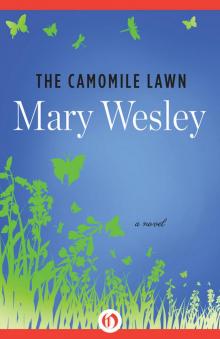 Camomile Lawn
Camomile Lawn Darling Pol
Darling Pol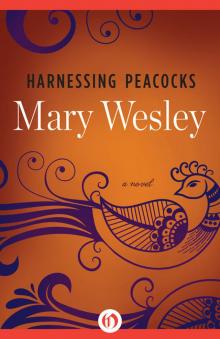 Harnessing Peacocks
Harnessing Peacocks